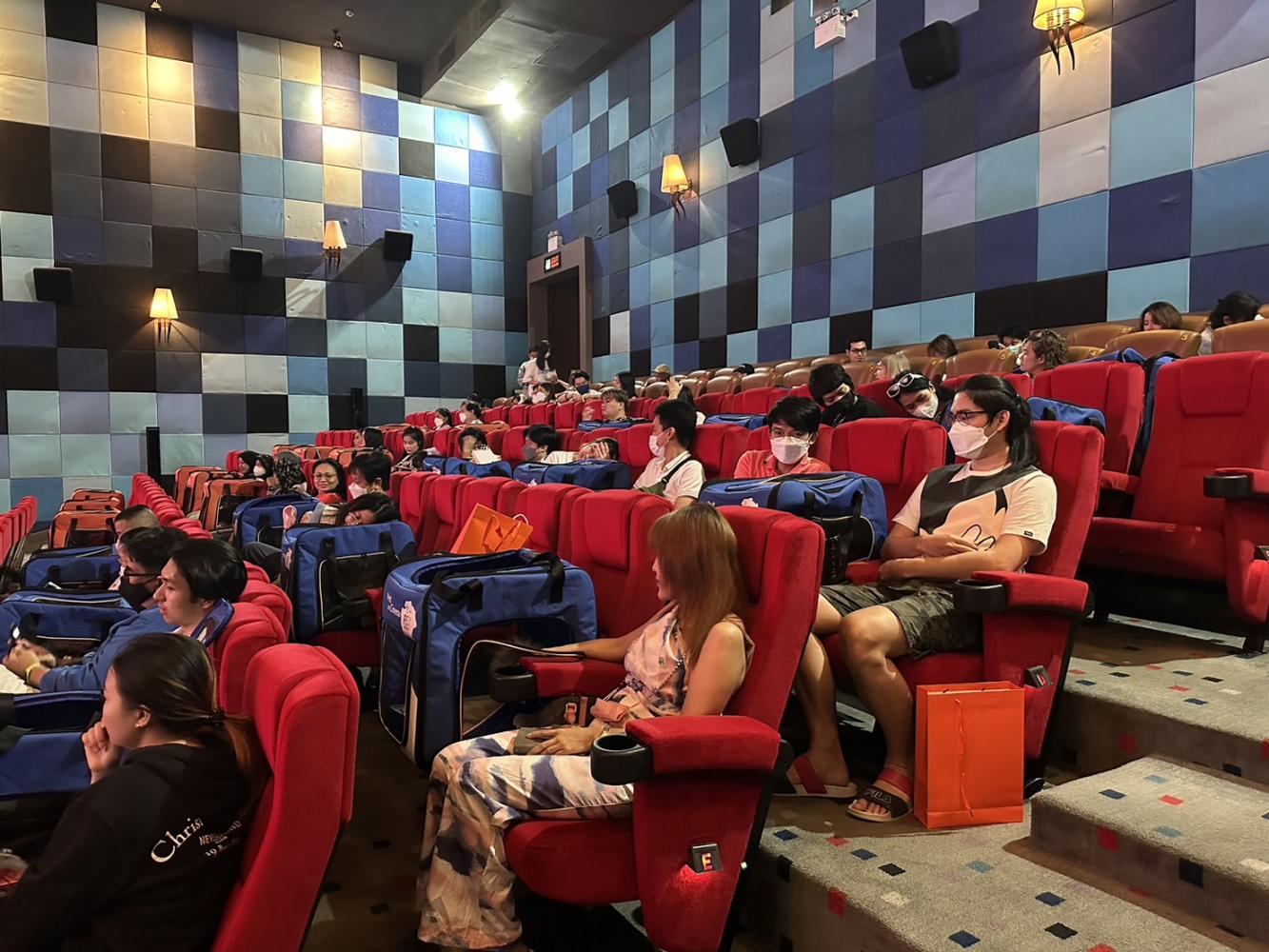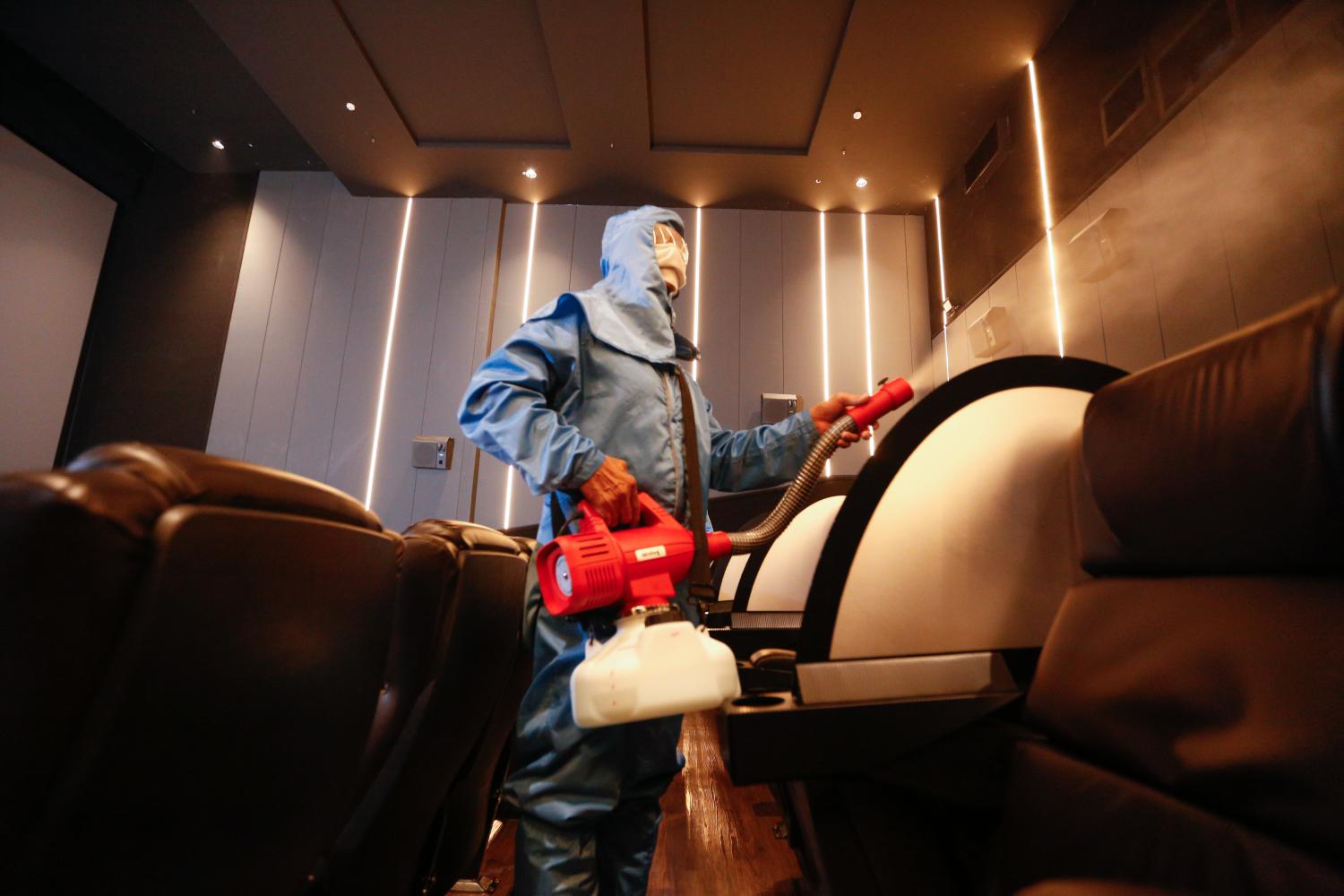The Bangkok arthouse cinema House Samyan may look a little different today to frequent cinemagoers and cinephiles. Along the corridor of the 5th floor of Samyan Mitrtown, the cinema has placed memorable quotes from movies on the floor to remind people to keep their distance from one another. Masks, hand sanitiser, checking for fever, Thai Chana check-in -- audiences know the drill right from the entrance. But the most noticeable difference is actually inside the theatre itself. Empty seats and rows make sure people sit relatively far from one another. Partitions were installed between seats.
The reopening of cinemas sees several protective measures being put in place to welcome patrons back following the months-long closure of public venues to limit the spread of Covid-19. The government finally allowed the silver screens to open again last week, with operators breathing a sigh of relief to be back in business.
Chomsajee Techaratanaprasert and Pongnarin Ulice, executives of House Samyan, said that while they were happy to be back, they also said the state permission came as a surprise as they first anticipated a mid-June reopening. Getting a greenlight two weeks earlier than expected, and with just a few days to prepare, did catch them off guard. Still, they both put on a strong front to continue providing an outlet for small and independent movies from around the world.
For the reopening, the two executives brought back a programme of content that they felt would be in demand by audiences. Some of the movies being shown at House Samyan for the reopening week include Greed, Military Wives, Last Letter, The Lighthouse and more. About 10 films are currently in circulation among the cinema's three theatres.
"We looked back at the movies we were screening before we had to close during the lockdown. Many of them were screened only for a week, or even a few days. So, those are the ones we're bringing back now," said Chomsajee, adding that there have also been efforts to seek alternative programmes and classics since new movies from big studios have yet to be released. One new addition this week is Beautiful Thing, a 1996 gay film, for the occasion of LGBTI Pride Month.
During lockdown, with the choice of entertainment being limited, many people have relied on streaming services. Now that cinemas are coming back, how will people's reliance on streaming affect the silver screen?
Chomsajee said she views streaming and cinema as two separate windows.
"We don't see the two as each other's competition. We coexist. In the past, we've had cinemas and videotape markets. It's the same now. Cinema and streaming exist the same way in parallel to one another.
"But, in the end, it depends on customer behaviour and whether they want something new and fresh, or if they prefer to stay at home," she said.
Aside from content, the executives view that hygiene standards and protective measures will need to be taken seriously to give people confidence, which will allow them to watch movies with peace of mind. This will be important in urging cinemagoers to come back. Audiences are asked to keep their masks on during the movie. Food (and popcorn, unfortunately) are not allowed inside the theatre, while beverages are permitted.
But while they bring confidence, some of these measures also affect the business directly, too. With social distancing being observed, the assigned empty seats and rows within the theatres mean the cinema can now sell fewer tickets for each screening.
Due to curfew, it is also unable to offer late-night screenings.
"We now offer fewer screenings per day," said Chomsajee. "Normally, we could go up to six sessions in each cinema per day. Now, we're down to four. The amount of available seats we can sell are also reduced to only 30-40% of its actual capacity."
The cinema business suffered long before the closure order as some concerned audiences shunned crowded public venues in January when the virus first became known. Despite the reopening, the cinema may not turn a profit for the time being. Still, Pongnarin said it's better than not opening at all.
"With our kind of business, we need people, so we need to be open," he said. "People may be hesitant at first despite all our preparations. But, eventually, they will return. This is probably all there is to the new normal anyway. We put on masks. We wash hands. We sit far from one another. We may have to do these things for a while, but what we've been doing for longer than that will eventually impact us more. People have been riding on crowded buses for three months. They may start asking themselves why they can't go to the cinema."
Both agreed that current measures and adjustments done in the face of the pandemic won't be permanent.
"We operate now with the belief that all these things are temporary, and that they will pass," said Pongnarin.
But, at the same time, no one is really certain how long the pandemic will affect the cinema business.
"We don't dare to expect whether the situation will improve in one or two months. In the end, what we're facing is the pandemic and we don't know what the future will be until the vaccine is out," Chomsajee said.










